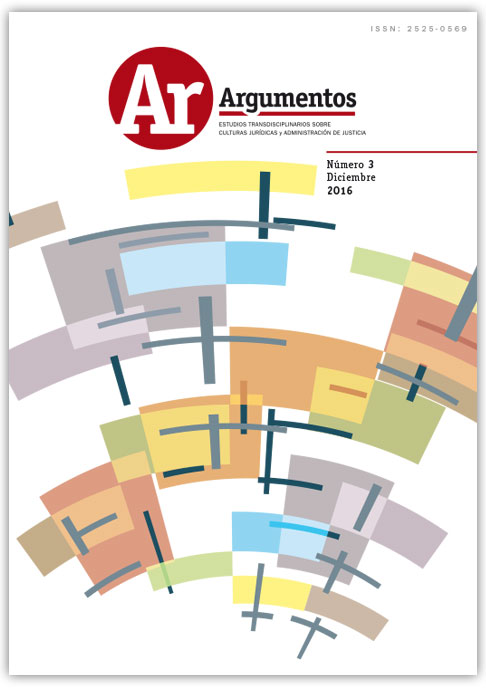El artículo 192 del Código Procesal Civil y Comercial de Córdoba, su constitucionalidad
Palabras clave:
Control de Constitucionalidad, Derecho de Defensa, Interpretación normativa, Analogía, Código Procesal Civil y ComercialResumen
La producción doctrinaria y jurisprudencial sobre control de constitucionalidad se asienta en la premisa consagrada en el Art. 31 de nuestra Constitución Nacional (CN) y para que este principio no sea meramente declarativo, existen mecanismos que permiten supervisar la supremacía. Se exige la construcción de un sistema garantista de defensa de la Constitución. Es innegable que la crisis de la justicia está presente en numerosos sistemas. En los códigos de procedimientos suele haber gran confusión y contradicción. Ante esto, analizar el ordenamiento es muy útil para descubrir si existen problemas de identificación del derecho debido a la imprecisión del lenguaje (problemas de indeterminación), al hecho de que no exista norma previa para regular un supuesto (lagunas que constituyen un problema de subdeterminación) o casos de exceso de normas (sobredeterminación) que a veces generan soluciones incompatibles (contradicción) o inconstitucionalidad. En este texto, se analiza si el artículo 192 del Título III, Capítulo III del Código Procesal Civil de Córdoba (CPCC) es contrario al artículo 18 CN y los tratados internacionales que integran el plexo normativo constitucional. Se considera que el derecho a no declarar contra sí mismo es fundamental en el proceso penal porque otorga al imputado un marco de seguridad jurídica y mantiene un equilibrio entre la búsqueda de la verdad material y los derechos fundamentales del imputado; pero no parece que debamos hacer analogía del proceso penal para decir que “tener por confeso al demandado” en el proceso civil viole su derecho de defensa.Descargas
Citas
Alvarado Velloso, A. (2012). Lecciones de derecho procesal civil. Rosario: FUNDECIJU.
Amaya, J. A. (2015). Control de constitucionalidad. Buenos Aires: Astrea.
Carranza Torres, L. (2016). Técnica de la prueba judicial y administrativa. Córdoba: Alveroni.
Cianciardo, J. (2010). El control de constitucionalidad de oficio y el juez como juez de la constitución. Una aproximación desde el caso puntano
José Agustín Ruta. Buenos Aires. Publicación Universidad Austral.
Díaz Villasuso, M. (2013) Código procesal civil y comercial de la Provincia de Córdoba: comentado y concordado. Doctrina y jurisprudencia. Córdoba: Advocatus.
Di Giulio, G. (2009). Consentimiento informado en el proceso. La Ley online, 1192.
Dworkin, R (2009). Los Derechos en Serio. Barcelona: Ariel.
Falcón, E. M. (2013). Tratado de derecho procesal civil y comercial. Buenos Aires: Rubinzal-Culzoni.
Gelli, M.A. (2006). Constitución de la Nación Argentina- Com. y Concord.; 3ª ed. Ampl. y actualizada; Buenos Aires: La Ley.
González Pérez, J. (1984). El derecho a la tutela jurisdiccional. Madrid: Cuadernos Civitas.
Gowans, C. (1987). Introduction. The Debate on Moral Dilemmas. En Moral Dilemmas, Oxford: OUP
Hare, R. (1988). Cómo resolver los problemas morales racionalmente. En Racionalidad.
Ensayos sobre la racionalidad en ética y política, ciencia y tecnología. México: Siglo XXI.
Hurtado, P. J. (1991). A propósito de la interpretación de la ley penal. En Doctrina Penal.
Lincon, Y. (2014). Inconstitucionalidad por omisión y rol de la Corte Suprema de Justicia de la Nación: análisis jurisprudencial. Período 2003/2013. Tesis Especialista en Derecho Público-UNC. Córdoba: EDUCC.
Mc Cormick, N (1984). Coherence in Legal Justification. En Theorie der Normen Festgabe für Ota Weinberger zum 65 Gebustag. W. Krawietx, H. Schlesk, G. Winkler y A. Schramm (eds.). Berlín: Duncker und Humblot.
Mc Cormick, N. (2010). Argumentación e Interpretación en el derecho. Doxa, 33.
Mennicken, A. (1970). Das Ziel der Gesetzesauslegung. Eine Untersuchung zur subjektiven und objektiven Auslegungstheorie. Hamburg.
Moreso, J. J. (2006). Lógica, argumentación e interpretación en el derecho. Barcelona: EDIUOC.
Nino, C. S. (2010). Introducción al Análisis del Derecho, Buenos Aires: Astrea.
Orrego, C. (2003). La Ontología del derecho justo. Progresos recientes de la teoría analítica del derecho. Revista Chilena de Derecho, 30, 2, Sección Estudios.
Tribunal Superior de Justicia de Córdoba, (23 de abril de 2013), Toranzo, Eduardo Marcio C/ Atanes Mesa Guillermo – Escrituración – Expte. 474052 – Recurso Directo (T 05/12). Vocales: A. S. Andruet (h) (Presidente), F. García Allocco y D. Sesin
Vigo, R. (1993). Implicancias de los principios en la teoría jurídica de Ronald Dworkin. En Filosofía del Derecho. Santa Fe: Universidad Nacional del Litoral. Verdaguer, A. C. (2014). ¿Cuáles son las reformas que necesita el proceso civil?. Derecho Privado,7, pp. 187-194.
Vilajosana, J. M. (2007). Identificación y justificación del derecho. Madrid/Barcelona: Marcial Pons.


